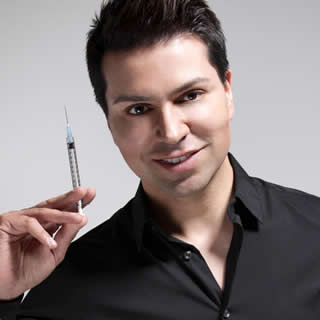 Botox or “Botulinum Toxin Type A” is a medical protein recognised for treatment in over 20 indications in both adults and children for many years. It is a powerful toxin but however, when used in safe, diluted, tiny doses it can successively treat a number of medical issues from muscle spasms, hyperhidrosis (excess sweating) to bladder problems.
Botox or “Botulinum Toxin Type A” is a medical protein recognised for treatment in over 20 indications in both adults and children for many years. It is a powerful toxin but however, when used in safe, diluted, tiny doses it can successively treat a number of medical issues from muscle spasms, hyperhidrosis (excess sweating) to bladder problems.
Botox is most widely known to temporarily eradicate wrinkles on the face. Commonly the forehead, glabella, eyes, bunny lines around the nose and in some cases wrinkles around the mouth and on the chin can be treated by this procedure. Advanced use in the neck muscles to treat “turkey neck” and for jaw slimming can also be employed.
Small doses are injected at precise points into overactive “dynamic” muscles causing the Botox protein to block the signals from the nerves to the muscles. The injected muscle is no longer able to contract, which causes wrinkles to relax and soften. Any “static” wrinkles however, caused by sun damage or gravity may not respond to Botox and your practitioner may advise on alternative treatments such as dermal filler injections e.g. Juvederm or Restylane to combat this issue.
Like all medicines, results from the procedure can take time to manifest. Most people discover pleasant, relaxed effects from a week to two weeks. After such time, your doctor will advise for you to return to clinic for a review which may also include a small “top up” if necessary to ensure that both he and you are happy with the results.
The results can last on average 3-4 months but vary from patient to patient. It is not uncommon for patients to notice that these results can last 6 months if the procedure is undertaken regularly and many patients comment that over time, they can leave more and more space between treatments as the effects of Botox seem to last longer for them.
Patients who are taking medication, drugs, herbs or supplements should speak to their doctor regarding whether they should have Botox treatment. Patients who have been diagnosed with Lambert-Eaton syndrome or myasthenia gravis should not be given Botox treatment. Those that are pregnant or breast-feeding should also avoid the treatment. You must disclose your medical history in full to your practitioner prior to undergoing any surgical or non-surgical treatment. Botox is a substance, which does have contraindications, and these can be discussed upon consultation with your doctor.
